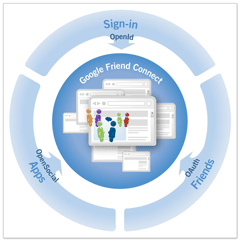It did not take long to find a Facebook Connect WordPress plugin… Continue reading
Image Credits: mkhmarketing

It did not take long to find a Facebook Connect WordPress plugin… Continue reading
Image Credits: mkhmarketing

Some time ago I wrote that a war was coming, yesterday the strike begun. Continue reading
Image Credits: saidunsaids

Turning and turning in the widening gyre
The falcon cannot hear the falconer;
Things fall apart; the centre cannot hold;
Mere anarchy is loosed upon the world,
The blood-dimmed tide is loosed, and everywhere
The ceremony of innocence is drowned;
The best lack all conviction, while the worst
Are full of passionate intensity.Surely some revelation is at hand;
Surely the Second Coming is at hand.
The Second Coming! Hardly are those words out
When a vast image out of Spiritus Mundi
Troubles my sight: somewhere in sands of the desert
A shape with lion body and the head of a man,
A gaze blank and pitiless as the sun,
Is moving its slow thighs, while all about it
Reel shadows of the indignant desert birds.
The darkness drops again; but now I know
That twenty centuries of stony sleep
Were vexed to nightmare by a rocking cradle,
And what rough beast, its hour come round at last,
Slouches towards Bethlehem to be born
There is something coming, as opposed to Yeats I don’t think it will be the end of the civilization, but there is a war coming.
Weapons are ready and skirmishes have begun.
Image Credits: Perry French
Google just released a preview of their new Google Friend Connect service.
Google Friend Connect lets you grow traffic by easily adding social features to your website. With just a few snippets of code, you get more people engaging more deeply with your site.
This is not a social network by itself, this is something that enables you to turn your own web site into a social network. I can’t wait to try it myself on this blog and build my own social network…

On a recent post about Global Languages and Social Media, Chris Brogan wonders whether his israeli friend Yuval should be blogging in English to have a better reach or in Hebrew to have a more involved local community.
Most of his colleagues and friends speak both Hebrew and English (at least!), but here’s the rub: if Yuval blogs in Hebrew, his friends and colleagues will be more engaged. If he blogs in English, he gets a potential larger audience.
Like some other commenters I would advocate for a multi-lingual approach (blog in both languages). Yuval could get an associate writer if blogging in two languages is too much work. If he cannot write in both languages, he should first blog in Hebrew (optionally writing some posts in English) and if he gains momentum eventually switch to full multi-lingualism.
However, what puzzled me most is one of the comments, from Hadassah, who wrote:
if he wants to reach readers outside of Israel, he really needs to blog in English, which I would consider the language of the web.
It reminded me about a mail exchange I had with a friend of mine about localization of his community web site, where he wrote:
I would like to educate a bit this community to talk in English, so I would prefer we do not try [to localize the web site] (translated from French)
He is French speaking, he wants to address an Asian community and he chose English. Fine, never mind the patronizing but how is the community going to react?
Despite statistics telling us that about 2 billion people are English Users in the world and that they represent about 30% of the Internet users, I don’t think that English is the language of the web.
I agree that English is a lingua franca on the Internet, like everywhere else in the world. Some people are using English to communicate with people who do not talk their own language.
I wrote some because even this is limited, Stephanie Booth has some posts and did some talks about that subject and here is what she says:
But doesn’t everybody speak English, more or less? Isn’t it the lingua franca of today that everybody speaks? It isn’t. At least not in the French-speaking part of Switzerland, and I’m certain there are many other places in Europe where the situation is similar.
The people who are reasonably comfortable with English around here will most often be those who have taken up higher academic studies, particularly in scientific subjects (â€soft†and “hard†science alike).
And I am sure this is the same everywhere around the globe, even worse. I know tech savvy people who took higher academic studies, French and Chinese alike, and lots of them are not comfortable enough to communicate in English. Stephanie even created pompage.net to help French speaking web designers to get access to technical content available in English only.
Most of the people are creating content for their family, their friends or their local community. When someone is talking about French politics, odds are good he will be writing in French, for French people.
And most of those people do not care about people outside their reach. So they do not even need their content to be localized. Somehow, this the long tail.
But if you want to address a larger community would you go English only?
The problem is that today you do not really have a choice, there is no affordable tool or service that would help you localize your content in multiple languages.
You can hire professional translators or have friends do that for you. Or if you are reasonably comfortable with English you can choose to create your content in English.
Some people do the latter, but in the process they miss a large part of their potential community. And we, as potential community members, are missing an awful lot of interesting content because their producers are not reasonably comfortable with English.